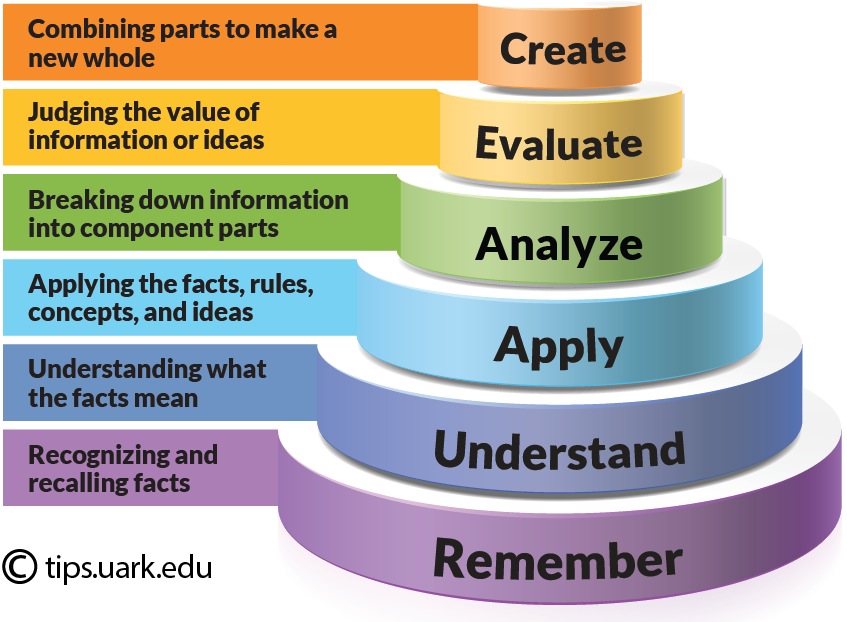In the second session of the Kaneb Center’s Foundations of Teaching series this fall, questions regarding the purpose and efficacy of quizzing came up during the discussion of a sample lesson plan that included an ungraded quiz at the end of a class period to measure learning. While some participants appreciated the low stress of such a quiz, some others were worried that the lack of a grade may decrease student motivation. Below, I will discuss reasons and strategies for using ungraded quizzes and provide suggestions for when grading might better reflect the goal of the quiz.
The Most Important Question: What is the Learning Goal of the Quiz?
The use of a graded or ungraded quiz should be tied to what you expect the student to learn from the specific quiz. Bloom’s Taxonomy is a useful classification of educational objectives and can help you evaluate what types of questions you are asking students and what level they are working at.
Bloom’s Taxonomy

Higher Level Learning Skills are always more nuanced and therefore often require complex argumentation rather than a single, correct answer. If you are testing for higher level learning, ungraded quizzes will enable students to focus on application, analysis, or another more complex skill without them having to worry about being penalized for being incorrect. Quizzes testing higher level learning skills can be used to generate further conversation on the given topic.You can discuss the answers to the questions afterward as a class, or even have students first discuss their answers on their own in pairs or small groups. A quiz testing higher level concepts will develop students thinking rather than just testing it. A grade on a quiz might not sufficiently capture the student’s thought process and might discourage them from taking a risk in their analysis, providing instead what they think they want you to hear.
If you are going to grade higher level learning skills, it is best to provide a clear rubric so that students know exactly how they are being graded. This more complex grading system is probably better left for a formal exam than a quiz.
If you choose to test higher level learning skills with a quiz at the end of class, students may be inclined to be more honest with you about areas where they are confused or lost. You can then use the quizzes to decide what overall lessons you might have to review in the class.
Lower Level Learning Skills are often more focused. If the quiz is administered primarily to confirm whether or not students have done the work, it would make sense to grade the work so that students are held accountable. That said, you want to be careful not to make the role of the quizzes and their grades seem primarily punitive. If you are merely testing for the completion of assigned work, ensure that the questions are relatively straightforward so that the prepared student in guaranteed to pass.
Still Worried About Motivation?
Make the ungraded quizzes part of their participation grade.
Grade the quizzes but keep the stakes low by having the quizzes account for only a small portion of the overall course grade.
Have the students create their own quizzes. In order to create their own questions, students have to have a good grasp of the material. If each individual student creates their own quiz, you can pair the students up and have them take each other’s tests and discuss the answers with one another afterward. This way each student is critically thinking about the material both when designing their own quiz and taking that of the peer. Students will also learn from each other’s shared knowledge of the topic.
Further Reading:
http://www.facultyfocus.com/articles/educational-assessment/frequent-low-stakes-grading-assessment-for-communication-confidence/
https://tips.uark.edu/using-blooms-taxonomy/
